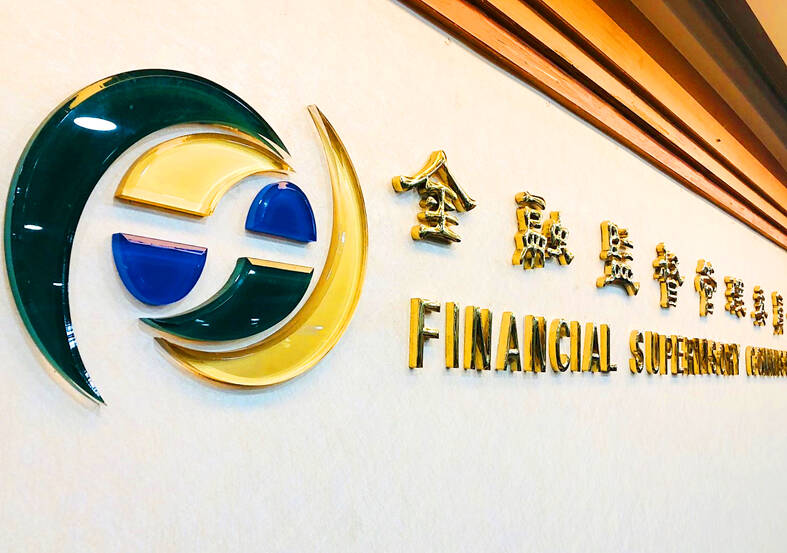The Financial Supervisory Commission (FSC) fined financial institutions and publicly listed firms a total of NT$107.07 million (US$3.29 million) in the first half of the year, about 2 percent lower than the NT$108.78 million imposed during the same period last year, data from the financial regulator showed yesterday.
The fines have reached about 38.98 percent of this year’s NT$274.68 million penalty target, the commission said.
The fines were given to correct the firms’ deficiencies, rather than as a means of generating income, it said.

Photo: Kelson Wang, Taipei Times
In addition to fines, the regulator’s penalties — issued by the Banking Bureau, the Insurance Bureau and the Securities and Futures Bureau — include corrections, improvements, warnings and restrictions, and a company can be required to dismiss or suspend directors, supervisors and managers.
In the first two quarters, the Banking Bureau imposed NT$39.66 million in fines, up 2.22 percent from a year earlier as it punished several banks for financial services misconduct and breaches related to internal controls and corporate governance, the data showed.
Among the severest penalties was a NT$12 million fine imposed on Taichung Commercial Bank Co (台中商銀) in February for oversight failures after chairman Wang Kuei-fong (王貴鋒) was found to have misspent more than NT$1 billion in corporate funds on personal luxuries.
The bureau imposed the second-highest fines of NT$8 million each on Shin Kong Commercial Bank (新光銀行) and Cathay United Bank (國泰世華銀行).
It punished Shin Kong in January, as the bank poorly exercised measures to prevent staff from misappropriating clients’ funds through online banking services and through improper financial dealings with clients, while Cathay United was penalized in March after a branch clerk misappropriated clients’ funds.
The Insurance Bureau issued NT$33 million in fines in the first six months, down 4.35 percent from a year earlier, with the largest fine of NT$9 million levied on the Taiwan branch of Cardif Assurance Vie’s (法國巴黎人壽).
The second-largest fine it gave was NT$6 million to the Taiwan branch of Cardif Assurance Risques Divers (法國巴黎產物保險).
Both fines were related to poor corporate governance and internal controls.
The Securities and Futures Bureau handed out fines of NT$34.41 million in the first half, down 4.31 percent year-on-year, with the largest being fines imposed on Time Securities Investment Consulting Co (時間投顧) and Cathay Securities Investment Trust Co (國泰投信) — NT$1.2 million each — for a lack of internal controls.

Vincent Wei led fellow Singaporean farmers around an empty Malaysian plot, laying out plans for a greenhouse and rows of leafy vegetables. What he pitched was not just space for crops, but a lifeline for growers struggling to make ends meet in a city-state with high prices and little vacant land. The future agriculture hub is part of a joint special economic zone launched last year by the two neighbors, expected to cost US$123 million and produce 10,000 tonnes of fresh produce annually. It is attracting Singaporean farmers with promises of cheaper land, labor and energy just over the border.

US actor Matthew McConaughey has filed recordings of his image and voice with US patent authorities to protect them from unauthorized usage by artificial intelligence (AI) platforms, a representative said earlier this week. Several video clips and audio recordings were registered by the commercial arm of the Just Keep Livin’ Foundation, a non-profit created by the Oscar-winning actor and his wife, Camila, according to the US Patent and Trademark Office database. Many artists are increasingly concerned about the uncontrolled use of their image via generative AI since the rollout of ChatGPT and other AI-powered tools. Several US states have adopted

A proposed billionaires’ tax in California has ignited a political uproar in Silicon Valley, with tech titans threatening to leave the state while California Governor Gavin Newsom of the Democratic Party maneuvers to defeat a levy that he fears would lead to an exodus of wealth. A technology mecca, California has more billionaires than any other US state — a few hundred, by some estimates. About half its personal income tax revenue, a financial backbone in the nearly US$350 billion budget, comes from the top 1 percent of earners. A large healthcare union is attempting to place a proposal before

KEEPING UP: The acquisition of a cleanroom in Taiwan would enable Micron to increase production in a market where demand continues to outpace supply, a Micron official said Micron Technology Inc has signed a letter of intent to buy a fabrication site in Taiwan from Powerchip Semiconductor Manufacturing Corp (力積電) for US$1.8 billion to expand its production of memory chips. Micron would take control of the P5 site in Miaoli County’s Tongluo Township (銅鑼) and plans to ramp up DRAM production in phases after the transaction closes in the second quarter, the company said in a statement on Saturday. The acquisition includes an existing 12 inch fab cleanroom of 27,871m2 and would further position Micron to address growing global demand for memory solutions, the company said. Micron expects the transaction to